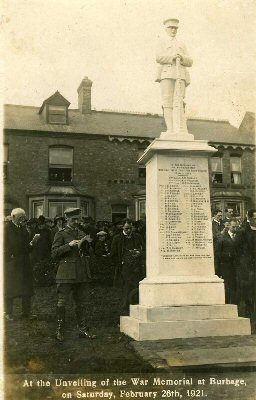Burbage Fallen
History of Burbage War Memorial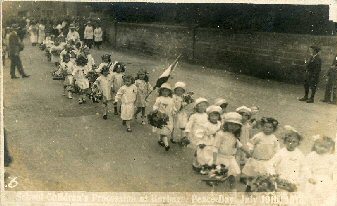
The first commemoration of the Great War in Burbage was the peace day parade by the local schoolchildren on 19th July 1919.
The Scholars planted four small oak trees at the side of St Catherine's Churchyard.
After the event, Charles Higham, the Headmaster of the Church of England School in the village suggested a committee should be formed to raise funding for a permanent war memorial. Leading members in the community and relatives of the fallen formed a war memorial committee of which Higham became Secretary.
By the middle of 1920 enough publicly subscribed money had been collected to procure a site and have the memorials foundations dug. Unfortunately the committees choice of site, 'the extreme end of the local churchyard' was evidently contrary to the wishes of the general public’.
The local Co-operative Society, whose members had contributed £100 towards the memorial, advised the committee that it would recall its subscription unless the site was reallocated to the village green (opposite the Co-operative Store).
Even the local schoolchildren became involved, when they were invited to write a composition on the idea of what type and where the memorial should be erected.
The late Kathleen Parker, born 1906, recalled that her idea so impressed Rector Pughe that he read it out at morning service. 'I had hoped for a small building with a chair so that people of all denominations could go and remember and make use of it, however a more traditional memorial was chosen, although it was built on the site I wanted'.
The matter was finally resolved in September of 1920 in favour of the village green after the committee had agreed to augment its numbers, presumably with those from the Co-operative Society who had been at the forefront of the protest.
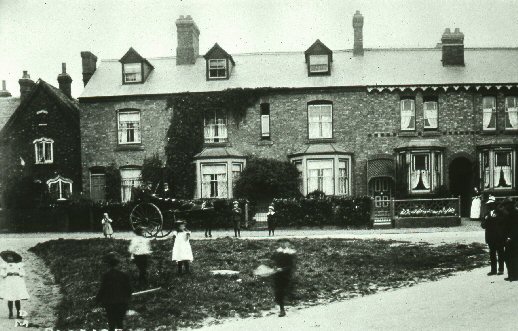
Notwithstanding the acclaim with which the memorial was greeted none of the press reports mention the sculptor who carved it. Unfortunately the war memorial committees minutes do not survive which would have perhaps mentioned the name of the sculptor, although it is known that Selina Lord of T. S. Lord & Sons Painters, Decorators and Plumbers, ordered the statue or the marble for it from Italy.
Frank Watts Ltd. Marble Merchants of Bishop Gate London supplied the Carrara Marble. The Lord family still own a complimentary leather wallet given to Selina with their trade address inscribed.
In Metheringham, Lincolnshire there is an almost identical war memorial statue, the work of a local mason Fredrick William Baldock. he two statues are almost certainly by the same person but unless documents are found the sculptor will have to remain unknown.
Reports on the cost of the memorial vary from £400 - £860.
War Memorial Unveilling - 26th February 1921
BURBAGE WAR MEMORIAL UNVEILING BY LIEUT-COLONEL C. H. JONES, C.M.G. - VILLAGE GREEN GARDEN OF REMEMBRANCE
Large numbers of people from
all parts of the Hinckley District, and practically the whole
of the
villagers, assembled at the village green last Saturday afternoon, to
witness the unveiling, by Lieutenant-Colonel C. H. Jones, C.M.G., the
gallant and popular commander of the 5th
Leicesters in France, of the memorial which has been erected to
commemorate the supreme sacrifice of the 54 local victims of the war.
For the purpose of the memorial the village green is being laid out as
a garden, surrounded by a holly fence. In the centre is a
monument consisting of a massive pedestal resting on a heavy base of
Bishopgate reconstructed stone, and surmounted by the life-sized figure
of a British 'Tommy' with arms reversed, cut in white Sicilian
marble. The total height of the monument is 14
feet, 2 inches and a more strikingly beautiful piece of work which was
executed at Carrara (Italy) would probably not be found in the whole of
Leicestershire.
ROLL
OF HONOUR
The front panel of the pedestal bears the following inscription in
imperishable lead letters:-
To the Memory of the Burbage Men who gave their lives for their
country, 1914 – 1918:-
Second Lieut. A. W. Dudley, 2nd Lieut. H. S. Pilgrim, 2nd Lieut. W. G.
Robinson, Pte. J. D. Adkin,
Pte. J. L. Aldridge, Pte. J. R. Arnold, Pte. J. H. Asbury,
Pte. J. Alsop, Pte. B. Bates, Pte. F. Burton, Pte. H. Bass,
Pte. C. Barnes, Pte. F. Barnes, Pte. C. Bradbury, Pte. W. Bradshaw,
Pte. H. Charles, Pte. D. Charles,
Pte. T. Campton, Corpl. J Cook, Pte. A. Cook, Lance-Corpl. T. Cox, Pte.
C. J. Chamberlain, Pte. S. C. Foxon,
Pte. F. Forryan, Pte. J. Grimes, Pte. A. H. Ghent, Pte. J. Hill,
Lance-Corpl. T. H. Hamlet, Pte. W. Hinton,
Pte. H. James, Pte. E. H. C. Kelsey, Pte. R. G. Kelsey, Lce-Corporal G.
S. Kirby, Pte. W. H. Letts,
Pte. S. H. Musson , Pte. P. Malkin, M.M., Pte. J. Moore, Pte. W. Neal,
Pte. A. J. Paul, Pte. J. Paul, Pte. G. Rowley,
Pte. B. Robinson Pte. D. Robertson, Pte. B. Rowe, Pte. G. N. Scott,
Pte. P. Starkey, Pte. A. E. Smith,
Pte. L. Shilton, Pte. A. Smith, Corpl. J. Towers, Lance-Corpl. W.
Wormleighton, Pte. H. Wormleighton,
Pte. W. Webster, Pte. F. Wyles.
“Greater love hath no man than this, that a man lay down his
life for his friends”
The monument was erected by Messrs. T. S. Lord and Sons of Burbage.
The idea of laying out the green as a garden was initiated by Major C.
C. Hurst, who is generously providing rose trees whereby relatives will
each plant a tree of their own selection bearing a tab on which is
recorded the name of the fallen soldier. The garden will be
maintained by Major Hurst during his lifetime.
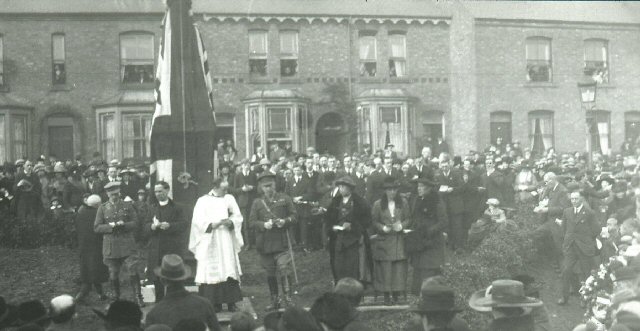
MANY FLORAL TRIBUTES
The gathering round the monument for the
unveiling was, of course, unique in the history of the
parish. Relatives of the fallen men, the majority of whom
carried floral tributes, many exceedingly beautiful, were accommodated
with seats in two sides of the enclosure, and a place of honour was
also allotted to some 300 ex-service men who “fell
in” at the Old Schools, and marched to the monument, under
the command of Major Hurst. Neither were many hundreds of
school children forgotten, and it was noticeable that they carried many
wreaths and other floral tributes.
The service opened with the singing of
the hymn “Jesu, lover of my soul”, after which the
opening sentences from the burial service were recited by the Rev. G.
A. Wooding, the Wesleyan Minister of Sapcote. The dedication
was performed by the Rev. R. D. H. Pughe, Rector of Burbage.
Before calling upon Colonel Jones to
unveil the monument, Lieut-Colonel E. C. Atkins of Hinckley, addressing
the gathering said his thoughts went back to pre-war days and the
thought of Burbage as a healthy, thrifty, industrious and peace loving
village, when no-one thought of war. The young men of the
place expected to live their lives as peace-loving men, but war was
thrust upon them, and he remembered in the early days of the war how
the young men of the parish at once rushed to the colours, and played
their part, knowing that it was a just and righteous war on our
side. When the call came the young men gave themselves
unhesitatingly in their country’s cause, and in passing
through the war many laid down their lives and helped to pave the way
to peace again. On the monument which they had erected in
Burbage, was to be found the names of men who served in all branches of
the services, and men who fought under Colonel Jones.
COLONEL
JONES AND THE CALL OF THE DRUM
The monument was then unveiled
by Col.
Jones, who by pulling a cord slipped the huge Union Jack and revealed
the handsome figure of the soldier. Colonel Jones saluted the
monument, and addressing the gathering, observed that the monument
would stand for all times as a tribute to the great work of Burbage men
in the war. What was wanted today was for people to
understand what they did and follow the example they had set
them. It was true that at one time all English people were
united, and did what they could to bring about victory in the Great
War. But there was the difference that the men whose names
figure on the monument were proven, whereas those living today remained
to be proven. The sound of the drum which called them to
battle was now sounding the people at home. We had still to
work out the peace which we inherited from them.
Colonel Jones added that it was
his lot
to be with men in the war, including some whose names were recorded on
the monument. In those hard and trying times they were all
happy together, contented, and even merry, and each trusted the other,
and they had perfect faith in one another. Men would carry
cruelly heavy loads without a complaint from behind the lines to the
trenches, because they realised the necessity for helping their
comrades in the line. Men coming from the coast had told him
the nearer they got to the trenches the worse became the condition
under which men were having to live, yet better and better got the
behaviour of the men, while in the trenches each was helping the other
in carrying out the ordinary rules of home life. This, added
the Colonel, was a lesson which the people at home might very well copy
from the men who occupied the trenches. What they wanted to
teach in their churches and homes was not the complicated intricacies
of any Act of Parliament and the transactions of County Councils; they
wanted the common lessons of simple life – he could think of
no better words than simple Christianity, or old-fashioned Christianity
– in order to get the peace they inherited from victory, 'To
bear no malice or hatred', 'not to
covet or desire other men’s goods' –
these were the rules of today. If men had despised and
distrusted their officers, or if officers had despised and distrusted
their men, the war would never have been won. What the drum
was calling today was for people to trust one another.
Colonel Jones concluded by reciting Bret
Harte’s 'Reveille', as follows:-
THE
REVEILLE
And of armed men the hum;
Lo! A nation’s hosts have gathered
Round the quick alarming drum –
Saying, “Come,
Freemen, come!
Ere your heritage be wasted”, said the quick alarming drum.
“Let me of my heart take counsel:
War is not life the sum;
Who shall stay and reap the harvest
When the autumn days shall come?”
But the drum
Echoed, “Come!
Death shall reap the braver harvest,” said the solemn-sounding drum.
“But when won the coming battle,
What of profit springs therefrom?
What if conquest, subjugation,
Even greater this become?
But the drum
Answered, “Come!
You must do the sum to prove it, said the British answering drum.
“What is, ‘mid the cannons’ thunder,
Whistling shot and bursting bomb,
When my brothers fall around me,
Should my heart grow cold and numb?”
But the drum
Answered, “Come!
Better there in death united, than in life a recreant – Come!”
Thus they answered – hoping, fearing,
Some in faith, and doubting some,
Till a trumpet-voice proclaiming,
Said, “My chosen people come!”
Then the drum,
Lo! was dumb
For the great heart of the nation, throbbing, answered, “Lord we come.”
Amongst a beautiful collection of wreaths were tributes from the Burbage Comrades of the Great War, the members of the Constitutional and Liberal Clubs, the Burbage Military Band (the members of which, at the commencement of the service, played Chopin’s Funeral March), Male Voice Choir (who led the singing of the hymns), Co-operative Stores, members of the Wesleyan Church, Wesleyan Church Sunday Schools, Parish Church Sunday School and members of the Co-operative Society.
After the ceremony large numbers of
wreaths were placed by relatives and others at the foot of the
monument.
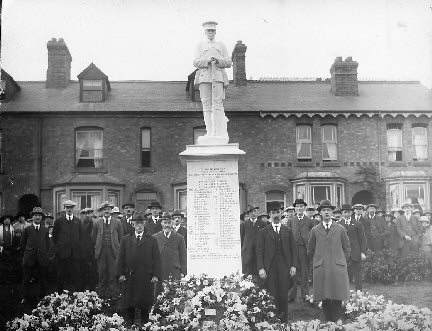
War Memorial Unveilling 24th October 1948
After the end of the hostilities of the Second World War in 1945, a committee of villages was formed to add a second plaque to the Burbage memorial. Tom McGrah, chairman and John Illiffe secretary, James Petcher treasurer, worked with the legion to collect subscriptions for a new plaque on the north face. George Williams of Mount Road, Hinckley carried out the work and inscriptions.At 3pm on the 24th October 1948, Lord Cromwell, D.S.O., M.C., patron of the Leicestershire and Rutland of the British Legion performed the unveiling ceremony. The British Legion paraded to the service, the Burbage Silver Band led the singing of the hymns and James Petcher recited the British Legions act of homage.
The service was led By Rector Rev. Pughe who had conducted the original dedication in 1921. The 1948 service was a more simple affair with an emphasis on ‘No Glory in War’.
The families of the fallen played more of a part, each member was given a special order of service with the person’s name inscribed and a special table was given for family wreaths.
